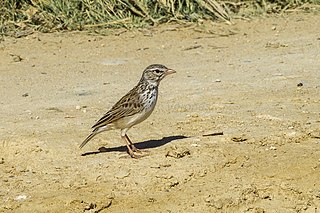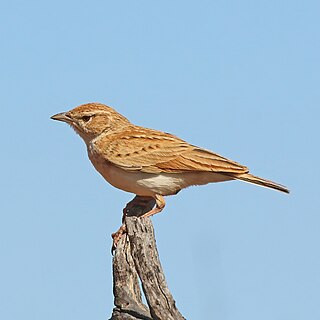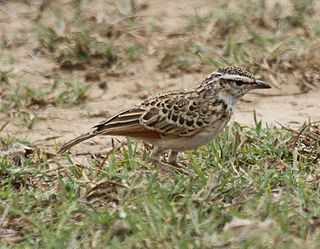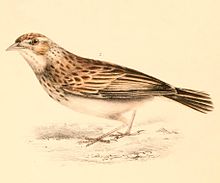
The Bengal bush lark or Bengal lark is a species of lark in the family Alaudidae found in southern Asia.

The rufous-tailed lark, also sometimes called the rufous-tailed finch-lark, is a ground bird found in the drier open stony habitats of India and parts of Pakistan. Like other species in the genus it has a large finch-like bill with a slightly curved edge to the upper mandible. The dull brown colour matches the soil as it forages for grass seeds, grain and insects. Males and females are indistinguishable in the field but during the breeding season, the male has a courtship display that involves flying up steeply and then nose-diving and pulling up in a series of stepped wavy dips accompanied by calling. They forage on the ground in pairs or small groups.

The singing bush lark or Horsfield's bush lark is a species of lark which inhabits grassland throughout most of Australia and much of Southeast Asia. It was described by the American naturalist Thomas Horsfield.

The Indian bush lark is a species of lark in the family Alaudidae found in South Asia.

Kordofan lark is a species of lark in the family Alaudidae found in Africa.
The Degodi lark is a lark in the family Alaudidae endemic to Ethiopia. It is now considered a subspecies of Gillett's lark.

The Madagascar lark is a species of lark in the family Alaudidae endemic to Madagascar.

The red-winged lark is a species of lark in the family Alaudidae found in eastern Africa.

The monotonous lark is a species of lark in the family Alaudidae found in southern Africa.

Friedmann's lark is a species of lark in the family Alaudidae found in East Africa.

The flappet lark is a species of lark in the family Alaudidae, widespread across Sub-Saharan Africa. The name flappet originates from the distinctive wing flapping sound made during its breeding season.

The sabota lark is a species of lark in the family Alaudidae. It is found in southern Africa in its natural habitats of dry savannah, moist savannah, and subtropical or tropical dry shrubland. It is generally sedentary but local movements occur in drier regions. The species name is derived from sebotha or sebothé, the Tswana generic name for a lark.

Williams's lark is a species of lark in the family Alaudidae. Discovered in 1955, much of its life and ecology is still a mystery to ornithology.

The short-clawed lark or short-clawed bush-lark, is a species of lark in the family Alaudidae. It is found in Botswana and South Africa. Its natural habitat is dry savannah.

Archer's lark, also known as the Liben lark, is a species of lark in the family Alaudidae. It is found in Somalia and Ethiopia. Its natural habitats are subtropical or tropical dry shrubland and subtropical or tropical dry lowland grassland. It is threatened by habitat loss. The bird's common name and binomial commemorate the British explorer and colonial official Sir Geoffrey Francis Archer.

Rudd's lark is a species of lark in the family Alaudidae. It is endemic to South Africa. Its natural habitat is high-altitude grassland. It is threatened by habitat loss.

The rufous-naped lark or rufous-naped bush lark is a widespread and conspicuous species of lark in the lightly wooded grasslands, open savannas and farmlands of the Afrotropics. Males attract attention to themselves by a bold and often repeated wing-fluttering display from a prominent perch, which is accompanied by a melodious and far-carrying whistled phrase. This rudimentary display has been proposed as the precursor to the wing-clapping displays of other bush lark species. They have consistently rufous outer wings and a short erectile crest, but the remaining plumage hues and markings are individually and geographically variable. It has a straight lower, and longish, curved upper mandible.

The fawn-coloured lark or fawn-coloured bush-lark is a species of lark in the family Alaudidae. It is found in south-central Africa.

The white-tailed lark is a species of lark in the family Alaudidae found in Africa.

The foxy lark or Abyssinian lark is a species of lark in the family Alaudidae. It is found in east-central Africa.





















